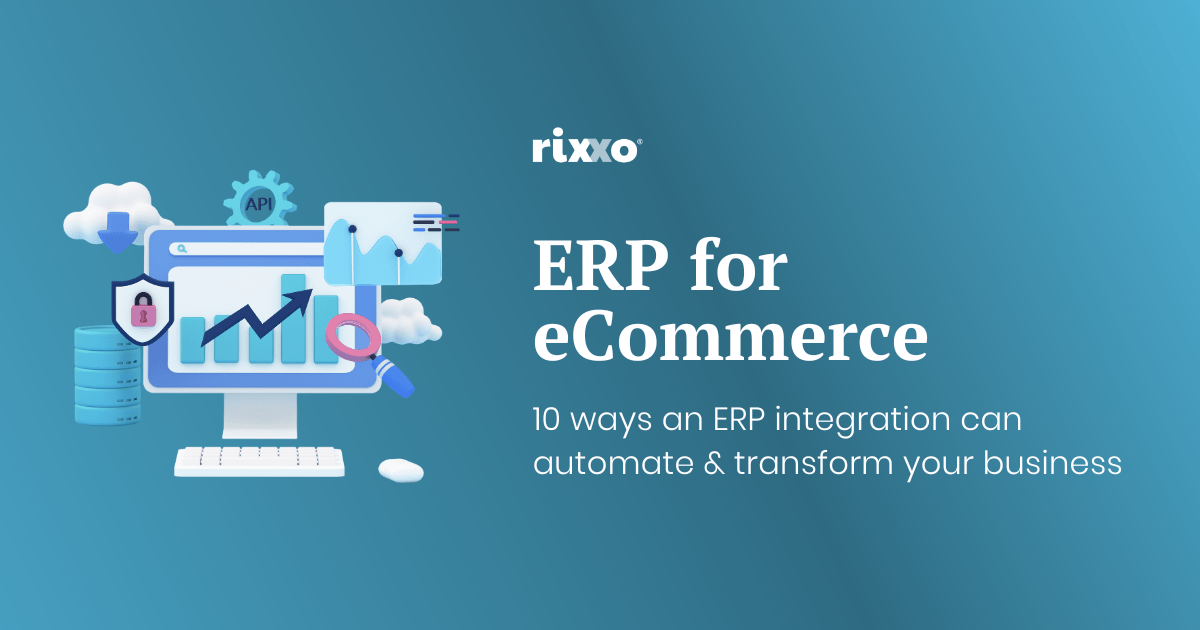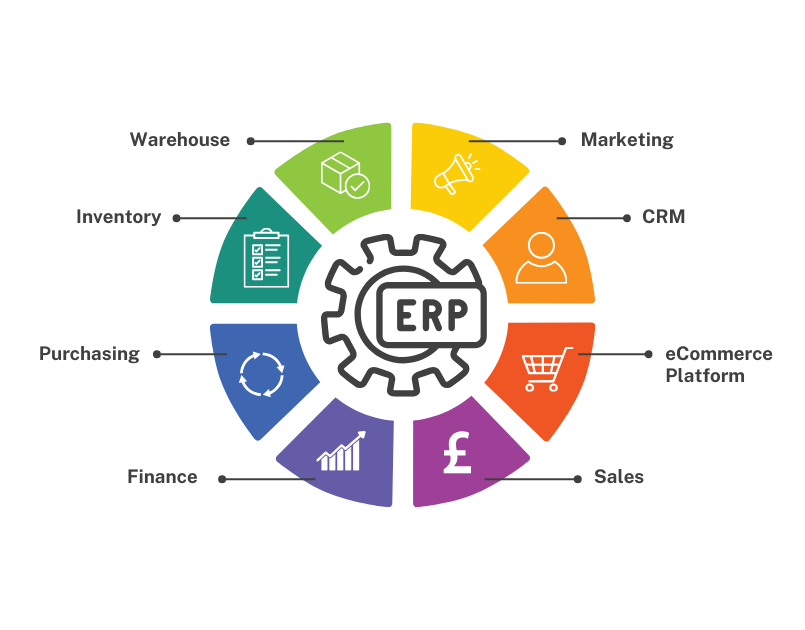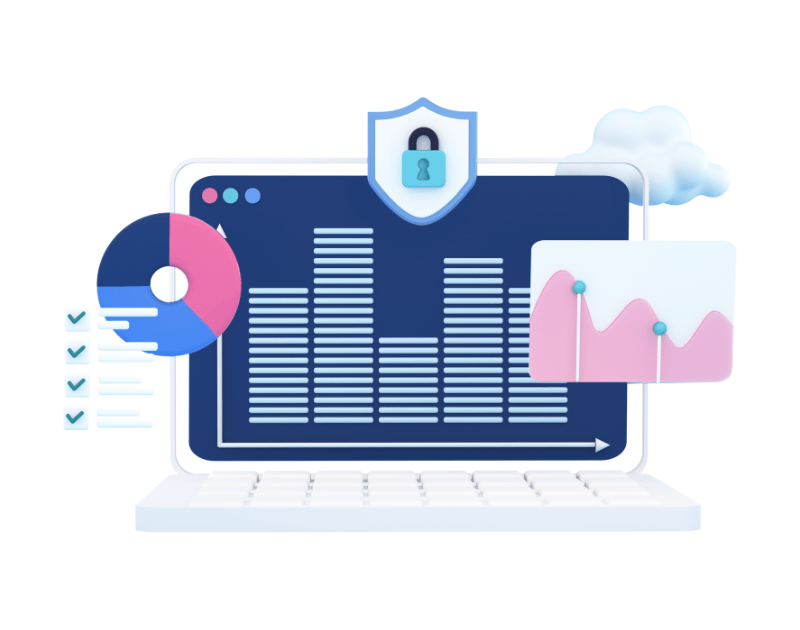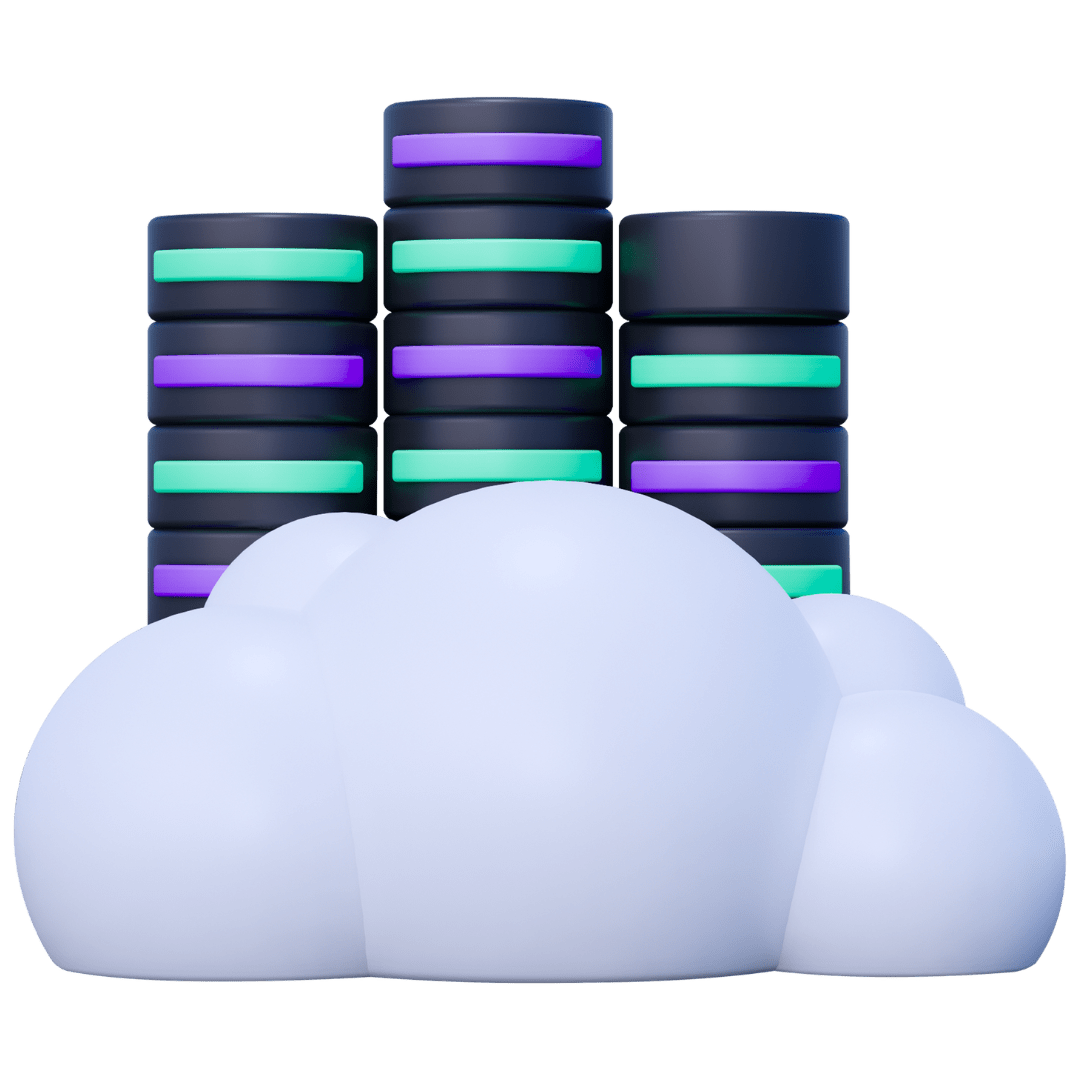10 Benefits of ERP for eCommerce Businesses

The eCommerce industry is fast-paced, unpredictable, and brutally competitive. Success means consistently exceeding customer expectations and harnessing technology to cater to a global audience. One such technology prevalent in almost every successful eCommerce business is Enterprise Resource Planning or ERP for eCommerce.
ERP software streamlines various business processes into a consolidated system, leading to unmatched business efficiency.
Consider this – in 2023, global eCommerce sales are expected to touch a staggering $6.54 trillion. But, with great opportunity comes great challenges. Heritage technologies, data discrepancies, and escalating customer demands could spell peril even for giants in the sector.
Enter ERP for eCommerce, where efficiency is much more than just a buzzword. So, let’s take a look at how ERP can reshape eCommerce businesses and why it’s one investment you can’t afford to ignore.
What is ERP in eCommerce?
Enterprise Resource Planning, commonly known as ERP, is a business tool that integrates various functions such as inventory management, finance, customer relationship management (CRM), human resources, and others into a unified software system. It allows businesses to manage different operations in a streamlined manner, significantly reducing both time and effort.
So, what exactly does ERP integration mean in the eCommerce context? Put simply, it’s the strategic merger of an eCommerce platform with ERP systems. It creates an automated gateway for data to flow seamlessly between the two, eliminating unnecessary manual tasks. This achieves real-time synchronization of crucial business information across platforms — such as customer details, order statuses, stock levels, financials, and product details.
In essence, an ERP for eCommerce integration provides eCommerce businesses with a real-time, 360-degree view of operations, blending the front-end and back-end systems into one user-friendly hub. In an industry where customer expectations evolve faster than technology, this real-time functionality is a game-changer, enabling unparalleled operational efficiency and customer satisfaction.
For a deeper look into what ERP for eCommerce can do for your business, along with real-life integration projects we’ve completed, check out our complete guide: Understanding The Basics: A Quick Guide To ECommerce Integration Platforms


10 benefits of ERP integration for your eCommerce business
Now we understand the basics of what an ERP does and how it connects up all of the vital elements of an eCommerce business, let’s dive into the 10 primary benefits you can expect for your business with an ERP integration.
Benefit 1: Increased efficiency
Modern eCommerce often drowns businesses in heaps of data, making operations stutter. ERP steps in, making sense of this entire ecosystem and turning chaos into order.
An integrated ERP for an eCommerce system is like a well-oiled machine, ensuring all parts of your eCommerce business work harmoniously. By connecting critical aspects such as online order fulfilment, inventory management, shipping, payments, and returns, it eradicates inefficiencies. No more data silos. No more disjointed processes. ERP integration ensures real-time synchronisation of data between your eCommerce site and other enterprise processes.
The result? Stock-outs or overstocks are a thing of the past. Manual data entry errors are slashed, and duplicate administrative tasks are eliminated. Simply put, ERP integration ends up creating a more efficient, accurate, and faster operational ecosystem that can be controlled through a single dashboard. Increased efficiency isn’t just a by-product; it’s a strategic outcome that drives business growth and maximises profitability.
Benefit 2: Real-time information


With an integrated ERP for eCommerce system, businesses get a real-time snapshot of virtually every key aspect of their operations – from inventory levels, order statuses, and customer buying patterns, to financial reports. It’s a birds-eye view that is consistently updated to reflect the precise, current state of the business at any given moment.
This real-time data can be an indispensable asset in decision-making. It allows you to identify trends, monitor performance, and forecast future outcomes with a higher degree of accuracy. It empowers you to anticipate changes in demand, optimise your inventory, and meet customers’ requirements promptly. With accurate financial data at your fingertips, strategic planning, investment decisions, and budget control become simple, effective, and instantaneous.
In a nutshell, easy access to real-time information through ERP integration is like having a crystal ball that provides insights for data-driven decision-making – paving the way for leaner operations, cost-efficiencies, and ultimately, a competitive edge.
Benefit 3: Automated inventory management
Inventory management is akin to a delicate balancing act. You want to have enough stock to fulfil customer orders promptly, but not so much that it locks up your capital and occupies shelving space unnecessarily. Keeping this balance right is often a challenging task, especially in an eCommerce business where demand can fluctuate rapidly.
An integrated ERP system connects the eCommerce platform to the warehouse, presenting real-time inventory visibility to your team and customers. When a product’s stock dips below a set threshold, ERP can automatically trigger procurement orders, ensuring that you’re never out of stock. Likewise, when certain items aren’t moving as expected, the system alerts your team to prevent overstocking.
On top of this, ERP integration allows for the implementation of just-in-time inventory principles, eliminating the need for extensive warehousing. By reducing instances of overstocking and stock-outs, businesses can minimize holding costs and maximize profitability.
With ERP, you can bring robustness to inventory management, always staying one step ahead and ensuring prompt and accurate fulfilment of customer orders.
Benefit 4: Improved order processing
The impact of an unfulfilled or incorrectly fulfilled order on the customer’s perception of an eCommerce business can be severely damaging. With customers’ growing demands for accurate and speedy shipments, businesses can’t afford slip-ups in the order processing department.
Integrating ERP with your eCommerce platform streamlines the entire order processing workflow. From the moment a customer places an order, the relevant details are automatically fed into your ERP system – eliminating the need for manual data entry and its inherent risk of errors. The system processes the order, prepares the invoice, updates the inventory, and initiates shipment.
An integrated ERP also makes it incredibly simple to manage multiple orders simultaneously. It eliminates bottlenecks and ensures that your orders are processed and dispatched in the shortest time frame possible. What’s more, with real-time data flow, it enables accurate tracking of orders, shipments, and returns. The customer stays informed at every stage of delivery, enhancing their experience and relevancy to your brand.
ERP integration is like a pacemaker for your order processing, setting a consistent and efficient rhythm that results in fewer errors, faster order processing, and importantly, happier customers.
Benefit 5: Customer satisfaction boost
Customer satisfaction has evolved from being just a strategic advantage to a key survival metric. And the driving factors of customer satisfaction are accurate product availability, timely order fulfilment, and transparency in order processing. In each of these aspects, an integrated ERP system plays a role.
When customers land on your eCommerce platform, they expect transparency about product availability. An ERP system, through its real-time inventory management feature, ensures that your product listings on the platform are accurate and updated. This reduces scenarios where customers place orders only to be told later that their chosen product is out of stock.
In the case of order fulfilment, ERP integration excels at accelerating and streamlining the process. Thanks to automated workflows, orders are processed faster, shipments are dispatched on time, and customers can track their orders in real-time. The result? A smooth and satisfying buying experience.
These positive experiences gradually build trust in your eCommerce business. When customers consistently see that you’re delivering on your promises, they begin to regard your business as reliable and trustworthy. This loyalty not only leads to repeat purchases but also transforms customers into brand advocates spreading positive word-of-mouth.
By integrating an ERP system and thereby maximising customer satisfaction, eCommerce businesses foster an environment of trust and loyalty – the key ingredients for a thriving, long-lasting business.
Benefit 6: Better financial management
Mastering finances within an organisation can often feel like finding a needle in a haystack, particularly for bustling eCommerce businesses. ERP software serves as a solution, making sense of the numbers and offering comprehensive visibility into the economic aspects of operations.
ERP systems ingeniously synchronise all your financial data across different silos, funnelling them into one consolidated hub. Whether it’s sales revenue, costs, profits, or losses, every figure gets accurately captured and updated in real-time.
With a clear view of the financial landscape, businesses are better equipped to analyse their performance, while gaining invaluable insights into the profitability of different sales channels, products, or services. This data can highlight areas where businesses can trim costs and maximise returns.
Having accurate, up-to-date information also helps with planning and predicting finances. It lets businesses use their resources better, make accurate budgets, and forecast future finances more effectively, all contributing to a healthier bottom line.
Benefit 7: Scalability
A good business tool should grow with your business. Whether you have more products, orders, or customers, the system should easily adapt. That’s where ERP systems shine—they can scale up as your business does.
ERP systems scale smoothly with your eCommerce business. Whether you’re growing rapidly or facing peak sales during holidays, ERP adapts. It handles bigger databases, more users, and higher orders without a hitch.
You can also customise ERP systems by adding or removing modules as your needs change. Need a new payment method or advanced customer data? Your ERP system can do it.
Scalability avoids future system upheavals as your business grows. It keeps you ready for new opportunities. In short, with an ERP, your eCommerce is always ready to scale and grow.
Benefit 8: Better data security


Data is the lifeblood of an eCommerce business, and ensuring its security is vital. An intentional breach could disrupt operations, damage your brand’s reputation, and violate regulatory standards. Therefore, safeguarding sensitive business data is a top priority.
At its core, an ERP system centralises the data, enabling strict control and monitoring. With data flowing through a unified system instead of scattered across various platforms, securing and overseeing it becomes far more manageable.
ERP software also typically comes equipped with high-level security protocols, standing as a protective fortress for your data. These protocols include stringent access controls, firewalls, and encryption techniques to prevent unauthorized access and safeguard data from cyber threats.
ERP can also help with regulatory compliance related to data security. With features like real-time auditing and report generation, ERP systems can help ensure that your business meets all applicable data protection standards and regulations.
An ERP system isn’t just about managing your operations more efficiently; it’s a dedicated partner in safeguarding your business data, offering you peace of mind.
Benefit 9: Improved reporting
Drawing meaningful conclusions and steering the direction of a business requires accurate and timely reporting — a task made simpler with the integration of an ERP system.
ERP serves as a centralized database hub, housing data from disparate operations, from sales to customer data, inventory to finances under one roof. This consolidation makes it easy to pull together comprehensive reports that might otherwise require hours of data collection and analysis, serving a more coherent and complete view of your business.
Automated report generation is a feature that most ERP systems offer. You can schedule daily, weekly, or monthly reports on various aspects of your operations. These reports are not only generated faster but also reduce the likelihood of human error, resulting in more reliable insights.
The ability to generate real-time reports aids in strategic planning and analysis for eCommerce businesses. Having the freshest data at your fingertips means you can easily identify trends, monitor key performance indicators (KPIs), and make data-driven decisions on the fly.
With an ERP system in place, businesses are equipped with superior reporting capabilities – transforming raw business data into meaningful insights for smarter, more effective decisions.
Benefit 10: Cost saving
For eCommerce businesses aiming for cost efficiencies, an ERP integration might be the ideal solution.
By automating repetitive tasks like data entry, order processing, and inventory management, not only do you save on time, but you also reduce the costs associated with potential human errors.
With a lean operation, your business can avoid unnecessary spending. For example, with improved inventory management, you are less likely to tie up capital in excess stock, and with better order processing, you can optimise shipping costs.
The real-time data insights that ERP provides can highlight areas of wastage or inefficiency you might have missed. Having this level of visibility means you can proactively make changes that reduce costs.
ERP’s magic lies in this:
By better managing your resources, automating tasks, and refining processes, you’re not just saving money, but forging a path towards long-term financial sustainability for your eCommerce business. All the more reason to place an ERP integration high on your priority list.
Conclusion: Embracing ERP integration is the key to thriving in eCommerce
In eCommerce, the businesses that seek tech solutions to enable smoother operations and sustained, scalable growth are the businesses that will win. ERP integration is a game-changer in eCommerce.
To sum up, ERP integration brings many benefits. It boosts efficiency by automating tasks and providing real-time data. It transforms inventory and order management, pleasing customers.
It also improves financial management, scales with your business, enhances data security and automates reporting. Plus, it saves costs.
In short, ERP integration is like a secret weapon for your eCommerce business and is essential for those looking for lasting success in a competitive arena.
For a complete guide to


Do you have questions about ERP for eCommerce integration?
Who better to ask than the team at Rixxo with hundreds of successful implementations?
